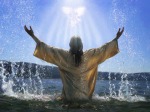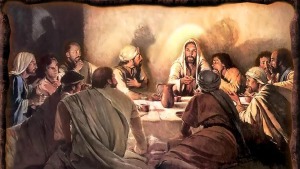 This Memorial Day, as we reflect on the sacrifices of soldiers who have given their lives for this country (and others), the secular blends with the sacred. Memorial Day falls on the last week of Easter, a short distance from the Ascension.
This Memorial Day, as we reflect on the sacrifices of soldiers who have given their lives for this country (and others), the secular blends with the sacred. Memorial Day falls on the last week of Easter, a short distance from the Ascension.
In the Liturgical Year, Jesus’ time on Earth – until he comes again—is coming to a close. Let’s take a moment to remember His time on Earth, one that takes form through and near the Blessed Mother, whom we honor throughout the month of May.
Jesus took the form of a human fetus in the Blessed Mary’s womb, was nourished by her blood, and He pushed through all the travails of an infant’s birth. He suckled on the Blessed Mother’s breasts, as she struggled – no doubt — to find clean water and sufficient nourishment for her newborn baby. She struggled to keep him clean and warm in the stable that served as the maternity ward of the Nativity.
 In those early days after the birth, while Mary was in seclusion, as required by the Jewish Law, she was visited by many: The Shepherds who came in the night, after the Angels announced the Savior’s birth, and the Wise Men from the East – all following the supernatural Star of Bethlehem. These visitors bowed deeply to this helpless infant, and they brought strange gifts – their lambs, gold for a king, frankincense for divinity, and, strangest of all, myrrh to bury the dead. While Jesus nursed and slept, Mary and Joseph pondered the implications of all that she had said yes to, when the Angel Gabriel announced God’s plan.
In those early days after the birth, while Mary was in seclusion, as required by the Jewish Law, she was visited by many: The Shepherds who came in the night, after the Angels announced the Savior’s birth, and the Wise Men from the East – all following the supernatural Star of Bethlehem. These visitors bowed deeply to this helpless infant, and they brought strange gifts – their lambs, gold for a king, frankincense for divinity, and, strangest of all, myrrh to bury the dead. While Jesus nursed and slept, Mary and Joseph pondered the implications of all that she had said yes to, when the Angel Gabriel announced God’s plan.
Joseph remained Jesus and Mary’s Earthly protector from danger — from the first days of Mary’s pregnancy, through the journey to Bethlehem, their stay in a stable rather than a room in an inn, and the dangers of King Herod. Those dangers gained immediacy when God spoke to Joseph in a dream, and told him to flee into Egypt. Through that flight, the Holy Family carried with them the grieving voices of the families whose infant and toddler boys were massacred in Bethlehem.
Jesus grew up in cosmopolitan Egypt, no doubt unaware in a human way of all that preceded his arrival into the world. Yet, when Herod passed, and the Holy Family returned, perhaps Jesus gathered the stories along the way, as the Holy Family resettled in Nazareth.
I often wonder, especially watching my own young children grow, how Jesus, as a fully human boy, came to understand his divinity. No doubt that knowledge was always within him, but also his human mind must have had to develop to fully grasp these truths. Or maybe not, for who can glimpse the things of God?
Jesus grew up with his parents and, no doubt, a large clan of relatives – aunts, uncles, cousins. He experienced the fullness of human life around him. No doubt he played, studied, searched the depths of the Sea of Galilee and the height of the constellations. He lived the rhythm of the Jewish liturgical year – the weeks culminating in Shabbat and the Sabbath, the annual high and lesser feasts, as well as the annual journeys to Jerusalem for the Passover.
 By age 12 he spoke with wisdom and authority. At about age 30, he walked into the Jordan River, along with scores of other Jews, to receive Baptism at the hands of his cousin, John the Baptist. John’s brief hesitation was forgotten as the heavens opened, and God the Father spoke of Jesus as his beloved son.
By age 12 he spoke with wisdom and authority. At about age 30, he walked into the Jordan River, along with scores of other Jews, to receive Baptism at the hands of his cousin, John the Baptist. John’s brief hesitation was forgotten as the heavens opened, and God the Father spoke of Jesus as his beloved son.
Jesus took time for purification before beginning his ministry – 40 days in the desert, where he faced every temptation, included the direct assaults of the devil. Yet, we know the devil had to have been pestering Jesus long before his time in the desert. I wonder what forms these assaults took in Jesus’ life. We know, of course, that the devil is as nothing compared to the power of the living God. The fact that Jesus rarely speaks of such detractors should encourage us to fear not, as Jesus lives in us.
Jesus turned to his three years of active ministry – gathering the disciples, teaching them, healing the crowds, preaching to them, challenging authorities, calling all to true holiness. He worked among the people to lead them and heal them. Ultimately this path led to a cross on Calgary at about age 33. Our God walked among us to lead us, to show us, to heal us, and – ultimately – to redeem us of our sins through extraordinary human suffering.
 He rose, as he promised, and the disciples were surprised. He stayed among them – feeding them, teaching them, exhorting them, empowering them. He does the same for us. For God came to earth to change us and to change the world, not just to show us a future with Him in a room He has prepared for us for eternity.
He rose, as he promised, and the disciples were surprised. He stayed among them – feeding them, teaching them, exhorting them, empowering them. He does the same for us. For God came to earth to change us and to change the world, not just to show us a future with Him in a room He has prepared for us for eternity.
Jesus’ Sacrifice challenges us, as he challenged the disciples: Follow the Commandments, feed my sheep, heal in my name, pray for miracles, never grow weary in serving others, lead by serving, shake the dust from your sandals at those hostile or indifferent, be courageous in your witness, eat my body and drink my blood, and you will have eternal life.
 The disciples did not want Him to leave them, and go back to the Father at the Ascension. We can relate. Through the Scripture passages for the daily and Sunday Masses, we’ve visited Him at his birth, we’ve been led by His star, we’ve suffered with him in the desert, we’ve listened to His words, we’ve been healed at His hands, we’ve been enlightened by His teaching. We want to hold onto him, and yet we hold him in our bodies through his self-offering, body and blood, in the Eucharist.
The disciples did not want Him to leave them, and go back to the Father at the Ascension. We can relate. Through the Scripture passages for the daily and Sunday Masses, we’ve visited Him at his birth, we’ve been led by His star, we’ve suffered with him in the desert, we’ve listened to His words, we’ve been healed at His hands, we’ve been enlightened by His teaching. We want to hold onto him, and yet we hold him in our bodies through his self-offering, body and blood, in the Eucharist.
And, like the disciples, now Jesus passes the baton to us. Are we ready to live the obedient, grace-filled, prayer-filled, service-filled, courageous lives He calls us to? Fear not, because He will always walk beside us. His sacrifice is the daily bread He gives to sustain our lives. His words fill us with truth. His suffering shows us how to suffer. His death on The Cross, his Resurrection and His Assumption show us the way to eternal life.
 In the meantime, we are called stop looking at the clouds, and do the work which He has prepared for us to do, in this, His Kingdom. “Thy Kingdom come, Thy will be done, on Earth as it is in Heaven.” Time to roll up your sleeves: The Kingdom needs you and me. The work we let the Lord do within us, and through us, will form a well-marked path of witness to the Lord.
In the meantime, we are called stop looking at the clouds, and do the work which He has prepared for us to do, in this, His Kingdom. “Thy Kingdom come, Thy will be done, on Earth as it is in Heaven.” Time to roll up your sleeves: The Kingdom needs you and me. The work we let the Lord do within us, and through us, will form a well-marked path of witness to the Lord.
We remember Jesus’ humanity in the ultimate sacrifice, this Memorial Day. And we trust in His divinity which nurtures, sustains and guides us each day we walk on this Earth.
Beautifully said!
I have a question: Have you changed the font size of your blog? I can hardly read it at all. Tiny tiny blurry letters.
Or do you think its my computer?
Thoughts? I love reading your blog, and would love to be able to read it more easily.
By: Doreen on May 30, 2011
at 7:19 pm
Hi, Doreen,
I’m sorry to hear you’re having trouble. No, we haven’t changed anything with regard to font size. I suspect this is a wordpress problem, as I’ve seen other sites having this issue. I will try to get to the bottom of it. Please keep in touch & let me know if things improve.
Anne
By: liturgicalyear on May 31, 2011
at 1:08 pm
One thing that has been suggested is to hit ctrl & F5 at the same time. Try this & let me know if it helps.
Anne
By: liturgicalyear on May 31, 2011
at 1:09 pm
Nope, it didn’t help.
It changed sometime in April.
Maybe I need a magnifying glass!
The print is so small, I can’t really see what I am typing here, and its really really sad because your blog is one of my favorites.
By: Doreen on May 31, 2011
at 11:08 pm
April! I know that wordpress changed its interface which has made if difficult at times to write & format. I will look into it and let you know what I can figure out. Anne
By: liturgicalyear on June 2, 2011
at 9:44 am